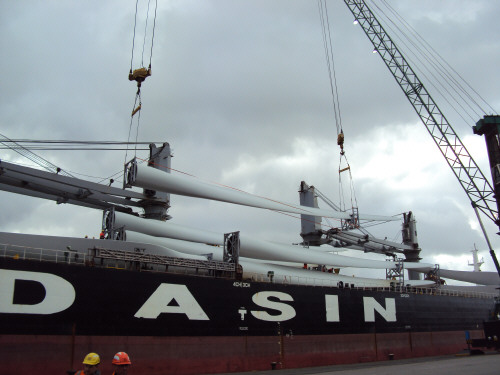
by logisticsplus | Mar 30, 2016 | News
Logistics Plus continues to support the energy industry by handling big and unique logistics projects for wind, solar, oil and gas companies around the world. The Logistics Plus Belgium office recently coordinated an ocean move of windmill blades from Tianjin, China to the Port of Antwerp in Belgium. This past weekend they unloaded the 18 windmill blades, each measuring 40 meters in length, and transferred them to trucks where they will be ground transported to their final destination in the Netherlands.
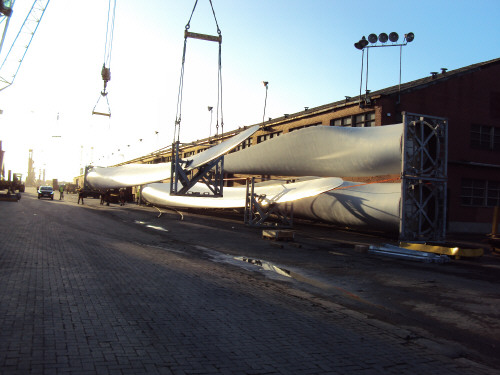

Need help with your big, unique or heavy-lift project cargo?

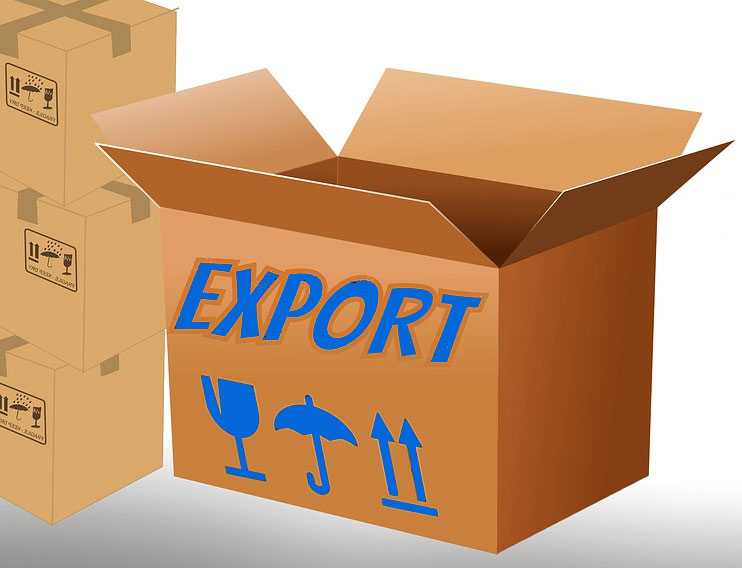
by logisticsplus | Mar 29, 2016 | News
 Exporting can seem like a daunting task to many small- and medium-sized businesses, but it can also be a great way to expand your customer base and grow your sales. Make no mistake, exporting can be a challenge. You have to take the time to select the right product, understand the applicable rules and regulations in both the U.S. and the country to which you are exporting, identify your potential customers, and find out about the different payment and shipping alternatives. Here are some tips for becoming a successful exporter.
Exporting can seem like a daunting task to many small- and medium-sized businesses, but it can also be a great way to expand your customer base and grow your sales. Make no mistake, exporting can be a challenge. You have to take the time to select the right product, understand the applicable rules and regulations in both the U.S. and the country to which you are exporting, identify your potential customers, and find out about the different payment and shipping alternatives. Here are some tips for becoming a successful exporter.
- Identify your potential market. If you’re interested in exporting, you need to identify the right foreign markets for your products. Information is readily available through government agencies and business-related organizations such as foreign trade associations, chambers of commerce, trade commission offices, and development centers (like the SBDC in PA). You can also visit www.export.gov to access a wealth of data that can assist you in identifying overseas markets for U.S. goods. Each foreign market has different trade barriers, import regulations, and technology considerations that may affect your exporting decisions.
- Assess your product potential. A product may be successful in the U.S., but that is no guarantee it will be successful in a foreign market. Preparing a product for export requires not just knowledge of the product, but also an awareness of the many unique characteristics of the market to which you are exporting. Cultural difference and local customs may also require product modifications in areas such as branding, packaging, and labeling. Awareness and sensitivity to these differences are critical to a successful product introduction.
- Know the export controls and licensing requirements. Exporting can expose your business to laws and regulations that you may not be familiar with. Different rules can impact your ability to successfully do business in foreign markets. Violation of these rules can have significant repercussions, including denial of our export privileges and fines.
- Investigate foreign country import controls. Before exporting your product to a foreign market, you need to identify whether the country you’re exporting to has any import controls related to the sale of your product. These can include prohibitions, restrictions, or import licensing requirements. Import documentation requirements and other regulations also vary by country.
- Understand U.S. export laws. As an exporter, you need to determine which federal department or agency has jurisdiction over the item you’re planning to export, and whether or not you will need an export license. The key in determining whether an export license is required for a given product is whether the item has a specific Export Control Classification Number (ECCN).
- Make sense of Incoterms. As an exporter, you need to understand the costs, responsibilities, rights, and obligations that accompany the use of a specific Incoterm. Every quotation or sales order must include a term of sale. If you fail to clearly identify the specific Incoterm to your customer, it can lead to an overestimation or underestimation of the costs associated with the goods you are selling (and ultimately a lost sale).
- Make sure you have the right insurance coverage. You need to understand the amount of insurance on your export transaction and who will be responsible in the event of loss or damage while the goods are in transit. Many freight forwarding companies will provide cargo insurance options to help address these risks.
- Hire a reliable freight forwarder. An international freight forwarder acts as an agent on your behalf and assists in moving your shipment from its U.S. origin to its foreign destination. Capable freight forwarders are familiar with the import rules and regulations of foreign countries, U.S. export regulations, methods of shipping, and required documentation. They can assist you in preparing pricing quotations by providing freight costs, port charges, documentation fees, insurance costs, and handling fees. They can also recommend packaging methods that will best protect your products during transport.
While the above tips are good for every exporter to know, if you work with an experienced and reputable freight forwarder, such as Logistics Plus, you won’t have to deal with too many of the details involved with exporting your goods to a foreign country. We have access to substantial shipping discounts for both international air and international ocean freight services, and our fees are very affordable. We can also provide you with valuable consultation on all aspects of global trade compliance, and we can even help you with financing solutions. Click the button on the left below to request more information, or the button the right to start the export quotation process.



by logisticsplus | Mar 28, 2016 | News
This is pretty cool. We were recently notified by Wikipedia that its article for Union Station (the global headquarters for Logistics Plus) was recently designated a “featured article” by the Wikipedia community (meaning it ranks as one of the best in encyclopedia). Wikipedia is a free encyclopedia, written collaboratively by the people who use it. It is a special type of website designed to make collaboration easy, called a wiki. Many people are constantly improving Wikipedia, making thousands of changes per hour. Click the image below to visit the full Wikipedia page and read the story.
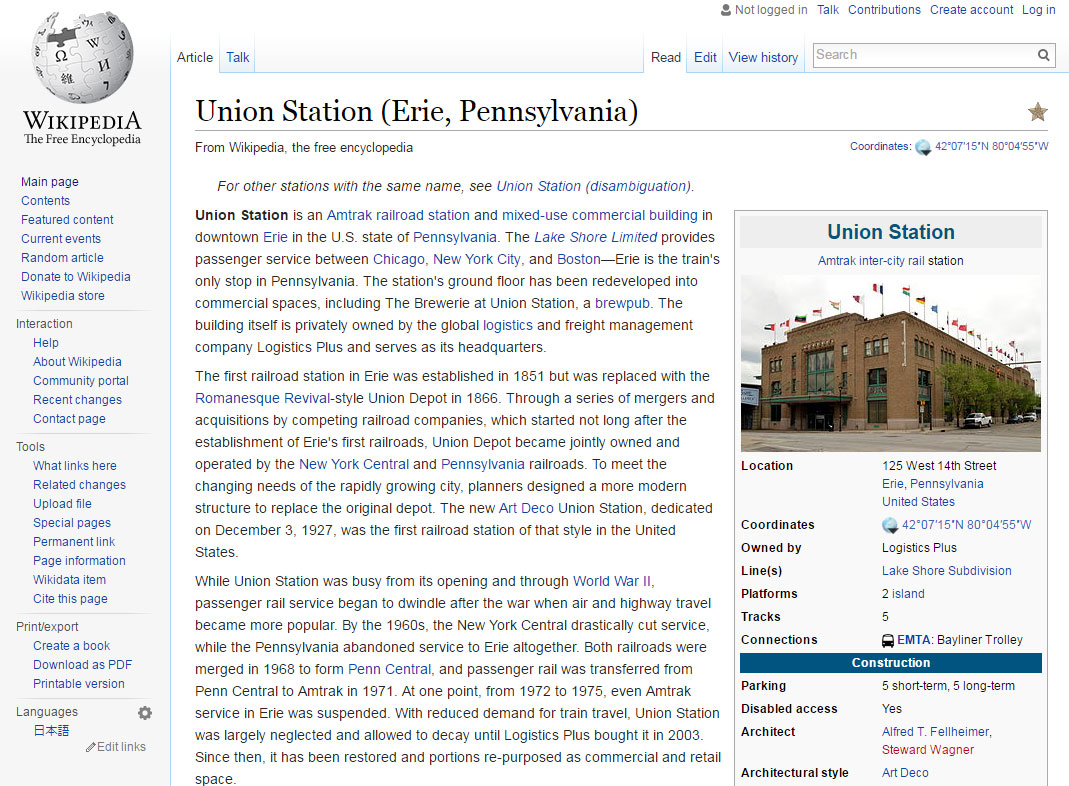

by logisticsplus | Mar 15, 2016 | News
 As depicted in the circle image of the Logistics Plus (LP) logo, we have the experience and expertise to help shippers move their goods by any transportation mode, including GROUND, AIR, OCEAN, or RAIL. How did we acquire these capabilities? It all started twenty years ago with our first customer, GE Transportation (GET), a division of General Electric – one of the largest companies in the world. Back then, LP was GET’s lead logistics provider helping them move their products and parts across the country and around the world. Twenty years later, we’re still managing shipments across all transportation modes, but today we’re doing it for more than 2,000 customers and in dozens of countries around the world!
As depicted in the circle image of the Logistics Plus (LP) logo, we have the experience and expertise to help shippers move their goods by any transportation mode, including GROUND, AIR, OCEAN, or RAIL. How did we acquire these capabilities? It all started twenty years ago with our first customer, GE Transportation (GET), a division of General Electric – one of the largest companies in the world. Back then, LP was GET’s lead logistics provider helping them move their products and parts across the country and around the world. Twenty years later, we’re still managing shipments across all transportation modes, but today we’re doing it for more than 2,000 customers and in dozens of countries around the world!
 Ground Freight Transportation
Ground Freight Transportation
Our domestic ground freight transportation capabilities have enabled us to be recognized by Transport Topics magazine as a 2015 Top 50 freight brokerage firm in North America. Our non-asset ground services include complete less-than-truckload (LTL) capabilities with all of the top carriers in the country, and a full-range of truckload solutions using our network of thousands of national, regional and specialized freight carriers. Additionally, with our National Truckload (NTL) division, we offer select clients the option for a dedicated fleet of trucks and equipment. When it comes to North American ground transportation, our carriers, services and rates are among the best in the industry.
 Air Freight Transportation
Air Freight Transportation
For air freight transportation, we can handle both domestic and import/export shipment types. We have developed relationships with all of the major air freight carriers allowing us to negotiate the best combination of service, price, and speed on behalf of our customers. Our services include airport-to-airport, door-to-door, and even air charters. We are also a certified IATA cargo agent in both the U.S. and Mexico, meaning we get exclusive access to the top air freight and cargo carriers in the industry. When customers ship internationally with Logistics Plus, they can also tap our full-service Customs Broker Solutions division to help them with all aspects of global trade compliance.
 Ocean Freight Transportation
Ocean Freight Transportation
Similar to air freight, our ocean freight transportation services are available for both domestic (i.e., AK, HI, PR, USVI, and Guam) and import/export shipments. As a Non-Vessel-Operating Common Carrier (NVOCC), we have long-standing relationships with ocean carriers which allow us to obtain competitive rates for our customers and frequent sailings to and from all major ports of call. We can handle both full-container-load (FCL) and less-than-container-load (LCL) ocean shipments. For international shipments, our customs broker solutions staff is there to help with duties, tariffs, and all other clearance details. For imports, our remote location filing (RLF) status with U.S. Customs and Border Protection (CBP) allows us to clear shipments at any and all U.S. ports of entry.
 Rail Freight Transportation
Rail Freight Transportation
If you’re looking to reduce your transportation costs, rail and intermodal freight transportation are often good options. Not only can we help you manage your rail logistics, we can also help you arrange the necessary drayage services to get your shipments to and from the rail yards. Because of our skills in this area, some of our customers have even asked us to provide dedicated, rail freight logistics management solutions for them (see our Hero BX case study for a great example).
 Project Freight Solutions
Project Freight Solutions
Sometimes our customers have very unique or complex logistics projects that require a “multi-mode” approach to transportation. In these cases, the Logistics Plus Project Cargo division is ready to assist. Your logistics project will be customized for your situation—from a comprehensive, pre-shipment evaluation of potential risks, costs and delivery schedules, to route and port surveys, coordination of proper packaging of components, required documentation handling, and transportation mode analysis. Even if your cargo is oversized or heavy lift, our project cargo specialists can manage it all. Over the years, we’ve transported locomotives to Indonesia; imported solar modules into the U.S.; shipped wind turbines to Finland; hauled tugboats to Kuwait; and much more! In many cases, these shipments all required use of ground, air, ocean, and rail freight transportation – all modes we know how to manage.
If you’d like to request a free quote on your next ROAD, AIR, OCEAN, RAIL, or PROJECT FREIGHT shipment, simply click the button below to get started. We’re ready to help you with your single-mode or multi-mode transportation needs.


by logisticsplus | Mar 14, 2016 | News
 Representatives from Logistics Plus are joining fellow freight forwarders from around the globe at the industry’s largest and most important business conference of the year — the 2016 WCA Worldwide Conference in Abu Dhabi, UAE. Abu Dhabi is at the heart of the fastest growing logistics region in the world. It is a modern and exciting city and has gained a worldwide reputation as a vibrant and secure destination for both business and tourism.
Representatives from Logistics Plus are joining fellow freight forwarders from around the globe at the industry’s largest and most important business conference of the year — the 2016 WCA Worldwide Conference in Abu Dhabi, UAE. Abu Dhabi is at the heart of the fastest growing logistics region in the world. It is a modern and exciting city and has gained a worldwide reputation as a vibrant and secure destination for both business and tourism.
Representing Logistics Plus at the event are Francisco Tijerina (director/LP Mexico), Jose Francisco Garza (managing director/LP Mexico), and Gabriela Garza (business development/LP Mexico). Francisco, Gabriela, and Jose (shown left-to-right in the photo) have been meeting with delegates from different countries to develop relationships, secure new trade lanes, and provide information on Logistics Plus global solutions.
The WCA event is expected have over 2,500 freight forwarding executives gathered for 3 days of intensive one-on-one business meetings and a wide range of social networking events. Acknowledged globally as the most important conference of its kind, the 8th WCA Worldwide Conference is being held from 12-16 March at the state-of-the-art Abu Dhabi National Exhibitions Company – and combines all four of WCA’s general networks within one major event. The conference is an integral part of the WCA Conference Week and is a must for all members of the WCA.
Click the image below to learn more about Logistics Plus freight forwarding expertise.
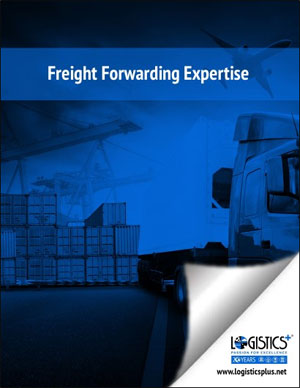











 Ground Freight Transportation
Ground Freight Transportation Air Freight Transportation
Air Freight Transportation Ocean Freight Transportation
Ocean Freight Transportation Rail Freight Transportation
Rail Freight Transportation

